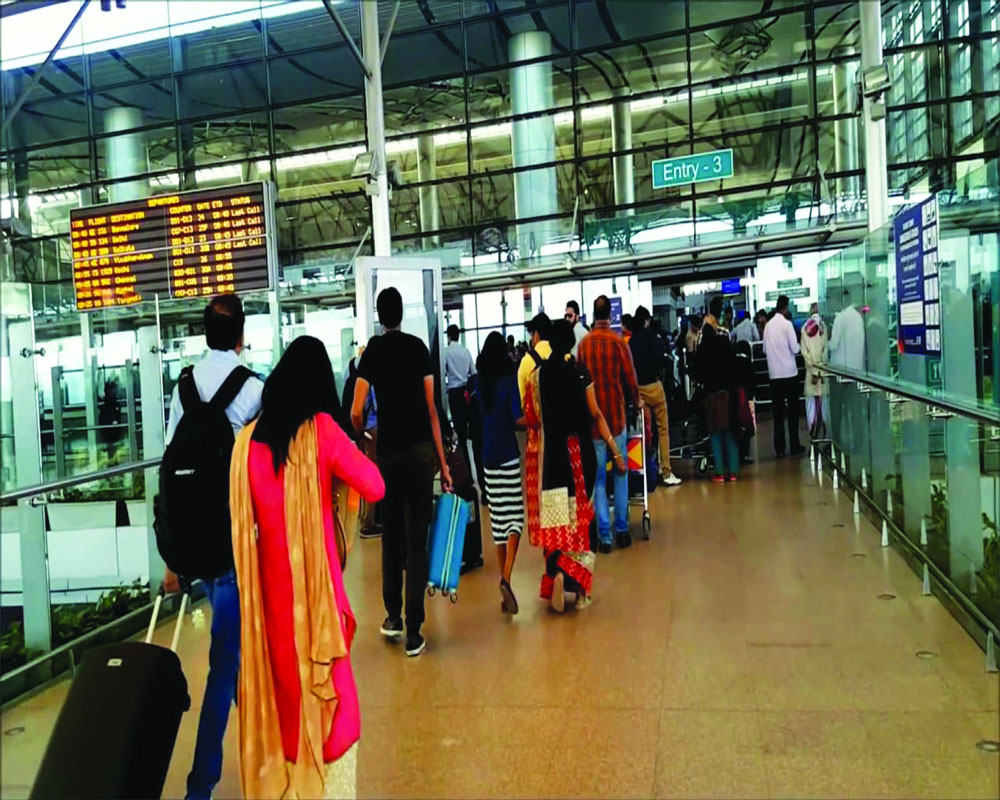Given quality education, our youth could bloom into so many qualified citizens that India would not be able to accommodate everyone
I share the general editorial delight at the electoral success of the Indian diaspora in the persona of Kamala Harris.
In my interactions with the citizens of other countries, in India or overseas, I have constantly felt that we are an intelligent mass of people, not merely in the sense of knowledge but also of wisdom. Given the opportunity of quality education, most of our youth would bloom into so many qualified citizens that India would not be able to accommodate everyone, no matter how big our economy. Emigration might not then be a major issue.
One can often mistake a headache for a tummy upset. Similarly, many Indians have persistently mistaken poor education for brain drain. Ideally, there should be guidance for those wishing to emigrate. We could call this the technology of migration. This entails learning the language and idiom of the country to which travel is desired, elementary whys and hows of that country and the way its people conduct themselves.
Such awareness would make assimilation easier and quicker. I have relatives in the US; one of them, a lifelong medical doctor having worked only in the State hospitals of Manhattan, would have met and worked with many American doctors, Black and White; yet, at her house parties, I have never met anyone except Indians. Her husband worked for IBM, but that also made no difference. These details do not speak of true assimilation.
Fortunately, Indian immigrants do not make collective demands on their host countries, unlike some assertive others. In Switzerland, a community demanded eternal graves for the buried to be “easily identifiable” by God’s representative on Doomsday. In Belgium, animal sacrifices by a community would be done in places of worship or their homes. Municipalities who found blood flowing out into the streets introduced a rule that goats and lambs could be sacrificed only in bathroom tubs. The remains of these animals had to be packed in a green plastic bag for disposal. Immigrants cannot be offensive to the original citizens. Cooking with strong masalas in a White locality was found to be highly objectionable some years ago. Potential emigrants must be systematically informed to take special care in order to make their acceptance in the new country as smooth as possible.
An objectionable practice of cricket-crazy Indian and Pakistani immigrants is waving the flag of their former nationalities during cricket matches in their host country, particularly England or Australia. British or Australian Whites must feel hurt, although they may not show it. But it stands to reason that their resentment would express itself through discrimination.
Traditionally in India, families expect new brides coming in to accept their new family customs in totality and not display overt nostalgia for their parental homes. This would be a useful example for immigrants to emulate upon relocation to a new country. With the advent of globalisation and obsolescence of colonialism, India needs to have not only more overseas contacts but also influence. One sure way is by winning the hearts of the people of those countries, by becoming welcome immigrants. Indians have another advantage over virtually all others, which is the ready spiritual potential of Hinduism. Though it is an American initiative, ISKCON has gone quite far. With an Indian initiative and good organisation, it could possibly go farther still. With increasing education and spread of awareness, it has become difficult for people to be confined to a single holy book that tells believers who their prophet and “only god” is. Today’s enlightened youth are unlikely to accept diktats unless backed by proof.
Hinduism has little compulsion; if a person believes in cause and effect, he or she can be a Hindu without abandoning his or her alternative religion. In short, acceptance of karma is sufficient to feel and be looked upon as a Hindu. Swami Vivekananda, in his short life, could explain to and inspire many in the West, which shows the worldly practicality of our spirituality.
Kamala Harris comes in at a time when America is confused, if not also divided between the so-called liberals and conservatives. There are differences between those who believe that since the US was sown and grown by continual immigration, its gates should remain open for new people, regardless of their ethnicity, and those who feel that indiscriminate immigration will threaten America’s very character that has made it the world’s wealthiest and strongest country.
President Joe Biden is the oldest candidate ever to be elected to office, and the focus therefore is more on Vice-President Harris than generally would be the case. She has repeatedly claimed to be Black, although she looks more Indian and is married to a Jewish gentleman — an unusual combination with political implications. She is evidently intelligent and perceptive and it would be interesting to see how she rides the trapeze of politics over the next few years. Unlike the President, she has a bigger stake in the revolving kaleidoscope of US politics.
Harris’ performance in Washington would also build or un-build the Asian persona and a woman’s image at the top of the country’s ladder.
(The writer is a well-known columnist and an author. The views expressed are personal.)
























